- Home
- Sam Savage
Glass (Small Press Distribution (All Titles)) Page 9
Glass (Small Press Distribution (All Titles)) Read online
Page 9
The butler died and no one replaced him, the gardener was let go, the animals in the hedges vanished into thickets of unpruned branches, pine trees and oaks sprouted from the flowerbeds. Schoolboys kept the lawns more or less mowed, and my father could still spend hours out there whacking at golf balls in all sorts of weather. I could hear the whacks from inside the house, on and on, a row of sharp cracks like rifle fire, a long silence while he walked to the end of the lawn and picked up the balls, and then more whacks when he knocked them back the other way. Sometimes a ball crashed against the side of the house or sailed through a windowpane. Papa really didn’t care about broken windows, and if the weather was warm he just left them that way, and at night insects swarmed through the holes and buzzed in desperate circles around the lamps—sometimes it was impossible to sleep because of the mosquitoes inside the house. In winter he blocked the holes with pieces of corrugated cardboard, but he never bothered doing that in summer, despite the insects, and one of the first things I would do on my visits home was walk through the house, count the holes, and hire someone to fix them. The iron fence did not receive a fresh coat of shiny black paint in the spring as before and turned brown with rust, staining my clothes if I brushed against it. The tips of Papa’s beautiful mustache, which in younger days had jutted like tusks, hung limply down the sides of his pendulous jowls. Not just his face, his whole body expanded and settled downward like sand in a sack—he became big-bottomed and florid and hitched his pants when he walked. When the roof began to leak, he sold off the slate shingles and replaced them with rolled asphalt. He had a partition built across the staircase, to save on heat, and slept in the study downstairs. Splotches of mildew blackened the wallpaper. I was young, I was trying to step forth, and all around me were deterioration and decay. I went home less and less often, and when I did go Papa seemed perplexed, and I wasn’t always convinced that he knew who I was. Knew at first blush, that is—he always figured it out once we got talking. His sense of humor grew unstable as well, unhinged practically, veering from hearty and vulgar to bizarre and gnomic at the drop of a hat. He tended to lag a few paces behind me when we went out for a walk, and I could hear him back there chuckling. He began to employ the self-referencing third person, speaking of himself as “this one”—“this one,” he would say, “is going to fix himself a gin and tonic”—and he would address me as “you one.” I am not sure that he did this to be funny. He became belligerent when people failed to get one of his jokes, and almost no one ever got any of them, since they rarely made sense. One day we were thrown out of a restaurant in Philadelphia because he was shouting at a man who had failed in that regard. I spent my days there reading or making meals for Papa or just wandering about in the garden. I liked it better now that it was in ruins. I slept on a sofa in the drawing room, and my father’s gigantic snores flew out of the study and mingled there with the buzzing of the insects. Had I been a child still, I might have floated off somewhere, to one of the countries I discovered on my stamps. Instead, I lay shackled to the sofa, rigid with anxiety, and pressed cushions to my ears against the unrelenting assault of Papa’s snores (I had not discovered earmuffs yet). At times I became completely frantic, and then I would escape to the bathroom and type until morning. I think that was when I learned to use a typewriter in this way—so as not to become frantic. It is easier not to feel alone when one is typing, even in the presence of the desolation of the Concerto for Orchestra. If this were a book with chapters, I would call this one “The Desolation of my Father Snoring.”
A fish was floating on its side, one of three orange fish, all the others being red and white. It had a long gray tail and was thoroughly dead. They all have long tails, and it used to be an orange fish, I ought to say, it being now pasty white and coming apart in the water, dissolving or fraying, except for the tail, which was unchanged in death, like our hair and toenails, they say. I had not been down there for several days, so I don’t know when it died, or of course why it died—not of hunger, I am sure. I lifted it out with a slotted spoon and flushed it down the toilet, and then I fed the others. I was still in college when my father died. Mama was also dead by then, though I don’t know if he knew that, as we never talked about her. He died suddenly one day while I was off at school of what I try always to think of as apoplexy, that sounding Victorian and dignified, rather than what it really was, acute myocardial infarction, which sounds perfectly heartless, nasty, and alone, sprawled on the bathroom tiles for three days before they found him. Myocardial infarction was the proximate cause, I ought to say, since in an overriding and actual fashion he died of an excess of drink. The house was sold, the debts were paid, and there was not a lot of money left over—not a lot, I mean, by the standards I had grown up with, though there was quite a lot by the standards of someone like Clarence, who had grown up with nothing—that might, I think, be the really fundamental difference between us. I spent a big piece of it in just three years, traveling to Europe and living in a nice apartment in New York, with big windows and pigeons on the balcony, before I met Clarence, and then a lot more of it afterwards, when we spent it together trying to be professional writers instead of working. After more than half of it was already gone I put the remainder in investments that were supposed to make it grow, on the advice of a man who had been an associate of Papa’s, but it never did grow—it did the opposite, did it quite slowly, though, so I didn’t notice the shrinking day by day but only after a number of years, by which time it had already shrunk. That was probably because, as I learned later, the man had only hunted quail with Papa, was not in business at all, and actually made his money painting pictures of racehorses. The fact that it then continued to shrink made Clarence desperate, and he was constantly after me to do something, but I did not do anything, since there always seemed to be enough for us to get by on if only we cut back a little. These days I tend to think of myself as impoverished. I tend to think it especially, even to the point of dwelling on it, when I happen to be feeling down for some other reason, because the milk has turned, for example, and at such times I have even said to people that I am impoverished. Potts, who offered to lend me money, was someone I once said it to. I am not strictly impoverished, in that I am not flat broke, except occasionally toward the end of the month if I have been rash. With four suppers at the diner, two trips to Starbucks for coffee and pastry, and a taxi ride back from the center, due to a large bag of groceries, I have already been rash this month and it has scarcely begun, and of course there is still the matter of the rent, or perhaps I should say the question of the rent, it having become questionable, having not been paid in full this month or the month before either. Instead of impoverished, I ought to say “in straitened circumstances,” though of course I actually will be impoverished in a few weeks, because of having been rash in the ways I just mentioned. I thought for a while that if this became a book I would call it Poor People, but I have decided against it, as that by itself, without explanation, gives a wrong impression: Clarence and I were never poor in the sense of living in a tarpaper shack and eating off tin plates. I was thinking of poor in the larger sense, as members of poor suffering humanity. I typed that and turned and the rat was looking at me, standing up against the glass and swaying back and forth, like Clarence in a doorway after a night on the town, holding on to the doorframe, I was thinking. I am finding its presence annoying and burdensome. After Papa died, I went to France for the first time as a grown-up. Most people I knew traveled by boat in those days; I went on the Ile de France with a friend named Rosaline Schlossberg. We had planned to spend the whole summer together but quarreled our first week in Paris, and she went on to London by herself and from there spread all sorts of rumors. She was not a friend in the strict sense, just an acquaintance; Clarence was my only friend in the strict sense. I imagine some people will prefer that I say something on the order of Clarence was the love of my life. I could just as well say that he was the boredom of my life, the annoyance of my life, the chief obstacle to
higher things of my life, and so forth. I can say, sincerely, that he was the person I most enjoyed typing with, on many different machines.
I am quite fond of the machine I type on now, have been fond of it ever since I bought it, at a store on Lafayette Street in New York just a month or so before moving to this apartment, even though I had already made up my mind to move and a typewriter was going to be just an extra thing to carry. I came here and got a job—not the one I recently stopped going to but the one before that—in a grocery store. That was the first time I had worked in the normal sense—in the pecuniary sense, I should say, since it did not feel normal to me. Obviously I had expected circumstances to turn out differently: I would not have bought a new machine just to type up a few letters and then stick it in the closet. I had owned a whole series of machines in the past but never enjoyed typing on them as much as on this one. It is a fairly big typewriter—I would describe it as a smaller office-type machine—made by Royal, and it emits a muffled yet solid-sounding thud when I strike it, as opposed to the cheap, tinny clatter the little ones make. A person need only hear the noise of the little machines, as I did constantly when Clarence used to type in our room at all hours, to be convinced that nothing worthwhile could possibly come out of one of those, though of course sometimes something actually does. When I say Clarence used to type at all hours, I am thinking of the habit he developed in the middle years of writing after he had taken too much to drink. We went to a lot of house parties back then, where there were hordes of clever people standing around. Clarence would get fired up by the clever conversations, and by the time we got back to our room he had usually convinced himself that he was hard on the track of something tremendously clever and beautiful. He would be terrifically impressed by the witty things he had found himself saying at the party and absolutely had to set it all down on paper right then and there for fear it would slip away while he slept. He would plant himself in front of that awful little Olivetti, as often as not standing in his underwear at the dresser, and clatter away while I was trying to sleep, now and then pausing to read over what he had written. He always approved of what he wrote in those states; I could hear him whispering plaudits to himself—“beautiful,” “fantastic,” “that’ll show ’em.” Thank goodness I had usually drunk quite a lot myself, as I regularly did in those days, and I would manage to fall asleep after a while and not wake up until the clatter stopped, startled awake by the silence or by the shaking of the bed when he finally tumbled into it, gray light of dawn at the window. Naturally he would find out the next day that what he had written in that state was not at all the stupendous thing he had imagined—it often did not even make sense, or it made sense but was trite or derivative or some other equally bad thing, and then he would be more depressed than ever. Of course feeling that way just made him want to go to more parties, even though I kept telling him we should get a place in the country somewhere and forget about those people, take walks every day over hill and dale and keep regular hours and drink less. I thought that if he could just forget for a while about becoming famous and start over from scratch, he would be all right. But of course he could not do that, because he knew in his heart that he was not all right. And then when we finally did do it, the regular hours, long walks, the whole kit and caboodle, really, it turned out to be a catastrophe—well, not a catastrophe, properly speaking; it turned out to be a letdown, at a time when we could not stand another letdown. Clarence wanted achievement as a writer, arrival at some recognized state of attainment, more than anything else in the world, except later perhaps whiskey, and later still whiskey and Lily, and for him that meant commercial success at least in a modest way and respect as a professional writer, from other professional writers, and it meant acting like a writer and doing writerly things like correcting proofs and attending publication parties of other writers whom we scarcely knew and who, when we crossed them on the street, failed even to nod in our direction. He was always peering over his own shoulder while he typed, wondering and worrying—and, toward the end, despairing—about what other people, especially people in the book business and later the movie business, were going to say about it. His idea of attainment was to eat in a restaurant in the Hamptons and overhear someone at another table whispering that the man sitting with the odd-looking woman over there was the writer Clarence Morton. I understood that this was an inherited disease of his, one he had brought with him out of his background, from having been born nobody and brought up among people who were always using the word “successful,” that it was not just an attitude he one day decided to have, and that that was why he was never able to rid himself of it, even though when we were first together I was confident that he could. He was capable of describing some person he had just met at one of those parties of his, after I had stopped going to them, as “a successful writer” or as having made “a successful movie.” I always objected to that way of talking, but I don’t believe he ever understood—he would give me a baffled look and say something idiotic like “What have you got against success?” There was, of course, no point in answering. Disgust, actually, was the reason I stopped going to those parties. And turning to me, someone would say, “And you, Edna, do you write also?” And I would say, “No. I type.” After he was writing regularly for magazines and after he wrote The Forest at Night, he truly was a successful professional writer, but he was not able to value it anymore. He could not value it because of me, possibly, because he knew that I did not place any value on it. So in our life together it became a question of which he was going to value, himself or me, and he could not make up his mind until he met Lily. With her, who did not value anything that I valued, he was able to break free and become himself again, though by then it was too late for that too. If I were feeling ironic, I would call my book How to Write Like a Pro. And I have to do something about the rat’s chips; I cannot just keep adding more on top. The tank is half full of them already, and it has made tunnels against the glass like an ant farm. A rat farm.
When I was talking earlier about the reasons I might stop typing—the need to ruminate and the desire to go do something else for a while—I forgot about key-jams. I never used to have them, and now there is one practically every day and at the worst possible moment, when I am least inclined to stop typing. I have not mentioned them until now because they are hard to talk about without seeming to complain. At times I become caught up in typing, so thoroughly in the throes of it that my thoughts run faster than my fingers can fly, they pile one on top of the other, and when a great many thoughts are making a racket in my head at once, I can falter, my fingers trip and stumble, and there are spasms: keys collide, pile up, and jam into a frightful tangle. To free the keys I have only to pry them up with my fingers, top key first and so forth—not difficult and scarcely worth mentioning were that the end of it. But that is not the end of it. After prying the keys up, my fingertips are stained with ink, and I have to get up from the table and trundle to the kitchen or bathroom. And there I cannot just stick my hand under the faucet—ink is not dust. I have to wait, tapping a foot or whistling irritably, possibly, until the water runs hot (it comes up from the basement and takes a long time), scrub my fingers, and then dry them on a towel, assuming there even is a towel, which I have just discovered there is not at present, the last clean one having gone for a dust rag, as I think I mentioned, or wipe them on my dress, as I have just done, or pants, or wave them in the air, pacing. Key-jams are maddening. One wants to flail the typewriter with one’s fists or even pitch it across the room as Clarence did once, and I do sometimes hammer the carriage with my forehead, though I know that does no good at all, except of course psychologically. He did not throw the typewriter because of a key-jam; he threw it because he had decided he was never going to write again, at least that is what he was shouting when he hurled it. He threw it another time as well, but the reason then also had nothing to do with key-jams or even with typewriters. He did not throw the same typewriter both times, as the one he thre
w the first time was thoroughly ruined and could not be thrown a second time, except of course in the trash. It was my typewriter he threw the second time, and he didn’t break it, since he threw it onto the bed. It occurs to me that people under the age of about thirty probably have no idea what a key-jam even looks like. If this ever becomes a book I am going to have to explain how typewriters work, and the book can include a picture of a typewriter with a little insert showing a close-up of a key-jam, to help them understand. At Potopotawoc they took away my typewriter. I had sent my luggage on ahead, and when I arrived my suitcases were lined up next to the cot in my cabin, but the typewriter was not among them. They told me it had become lost in transit, that they would get me another, but they did not. Then two weeks later I saw it in the director’s office. I was walking past, his door was open, and I spotted it on the floor beneath a chair. He said it had just arrived, but I didn’t believe him. The Peter Handke book has jiggled off as well, taking several of my pages with it, hitting the floor with a loud slap that made me jump. There are now a great many pages on the floor. You cannot, I suppose, call it a farm if there is just one animal.

 It Will End With Us
It Will End With Us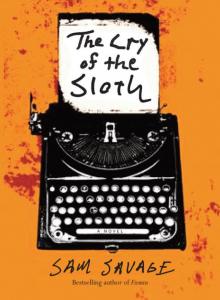 The Cry of the Sloth
The Cry of the Sloth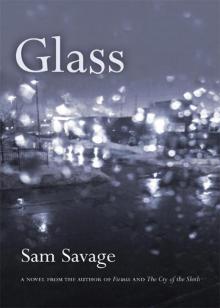 Glass
Glass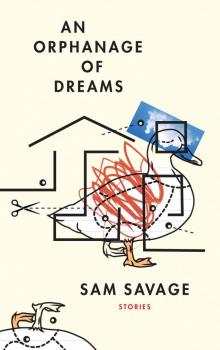 An Orphanage of Dreams
An Orphanage of Dreams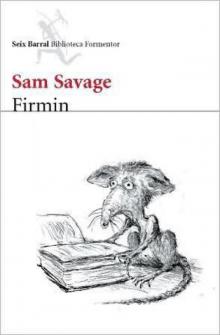 Firmin
Firmin Quantum Voices
Quantum Voices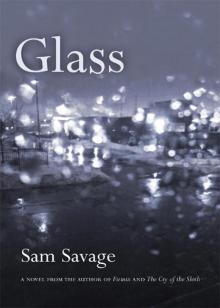 Glass (Small Press Distribution (All Titles))
Glass (Small Press Distribution (All Titles))